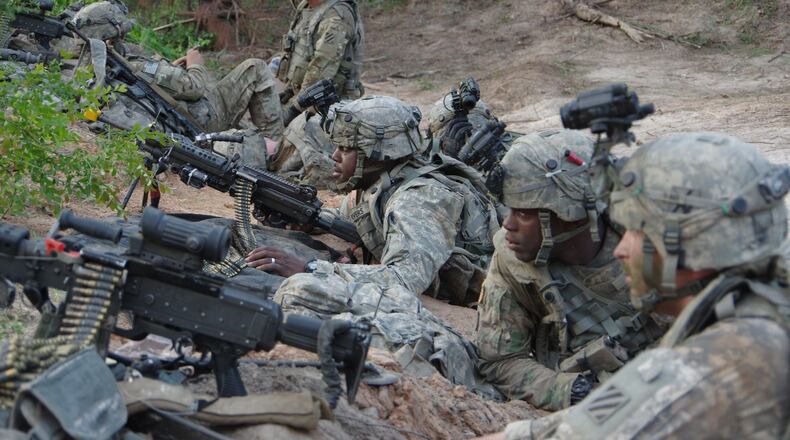The commander of the Georgia National Guard’s 48th Brigade is delivering an important message to the roughly 2,200 troops who will be deploying with him to Afghanistan in the coming months: Lace your boots up tight.
The Islamic State group is lurking in eastern parts of the country where the Georgia troops are headed, Col. Matthew Smith said in an exclusive interview with The Atlanta Journal-Constitution, sharing details from his recent reconnaissance mission to the region.
Of course, adding the Islamic State to the mix of other militants fighting in Afghanistan — including the Haqqani network and the Taliban — makes the battlefield more crowded, complex and dangerous.
In recent months, the Islamic State, also called ISIS, and the Taliban have each carried out shocking attacks in areas where 48th Brigade soldiers will be deployed. This month, ISIS detonated two bombs at a wrestling club in Kabul, killing 30 people, including a beloved journalist who died while reporting on the attack live on national television. And last month, the Taliban laid siege to the city of Ghazni for five days, leaving more than 200 Afghan police officers, soldiers and civilians dead.
Since returning from his trip to Afghanistan last month, Smith has briefed senior Georgia National Guard leaders and his troops about the risks.
“What I don’t want to have happen is a parent — God forbid something happens to a son or daughter and then the parent goes, ‘I had no idea they were even going to be in harm’s way,’” he said. “Just by virtue of the fact that you are going to Afghanistan — you are in harm’s way. So I am just trying to get that message out.”
Five battalions of Georgia guardsmen from across the state will train at Fort Stewart next month for their nine-month mission. They previously trained at the Joint Readiness Training Center at Fort Polk, La. A fraction of them will leave for Afghanistan this year. The rest will arrive there by the end of January. In addition to training Afghan troops and police, the guardsman will secure Bagram Air Base north of Kabul and help and protect U.S. Special Forces soldiers who are advising Afghan soldiers.
Protecting U.S. military trainers has become critical. Since July, two Fort Benning-based soldiers who were supporting the training of Afghan security forces – one of them was a command sergeant major, the top enlisted soldier for his unit – have been killed in “apparent insider attacks,” according to the U.S. Defense Department.
Smith shared a few other observations from his four days on the ground in Afghanistan:
• Because of its intense dislike for ISIS, the Taliban coordinates with the Afghan army to fight the group. The Afghan government, meanwhile, is seeking peace with the Taliban. So that can complicate how the guardsmen will target enemies on the battlefield. “Are they Taliban?” Smith said. “Do we want to go after that part of the Taliban. Or is that part of the Taliban that is interested in coming to negotiate at the peace talks or participate in a cease fire? Or is it ISIS?”
• The troops Smith’s brigade will be replacing — the Colorado-based 1st Stryker Brigade Combat Team of the 4th Infantry Division — has been involved in far more combat than Smith expected. The Colorado troops are conducting “pretty intricate operations,” he said, including air assault missions. “I was in some ways surprised because that will mean more of our soldiers will be at risk,” he said.
• It also became clear to Smith, who previously deployed to Afghanistan, how much the U.S. military has reduced its footprint there. Eight years ago, the United States had 100,000 troops in Afghanistan. Now that number is about 14,000. Some of the crowded lines Smith encountered for services at U.S. military bases have disappeared. “The most striking example,” he said, “was going to the coffee shop at Bagram and you just walk in and walk up to the counter.”
• The Afghan military’s professionalism has improved. “There has definitely been progress,” he said. “They are better than they were the last time I saw them.”
While highlighting the risks, Smith emphasized his brigade is full of experienced and capable troops, many of whom have deployed to other combat zones. The brigade, he pointed out, carried out a similar training mission in the same region of Afghanistan eight years ago. The Georgia guardsmen, Smith added, will be arriving in Afghanistan in the colder months when there is typically less fighting, giving them more time to get adjusted.
“We are very well suited for this from an experience and a culture standpoint,” he said. “That is not in any way trying to say it is going to be easy or without risk.”
About the Author
Keep Reading
The Latest
Featured




